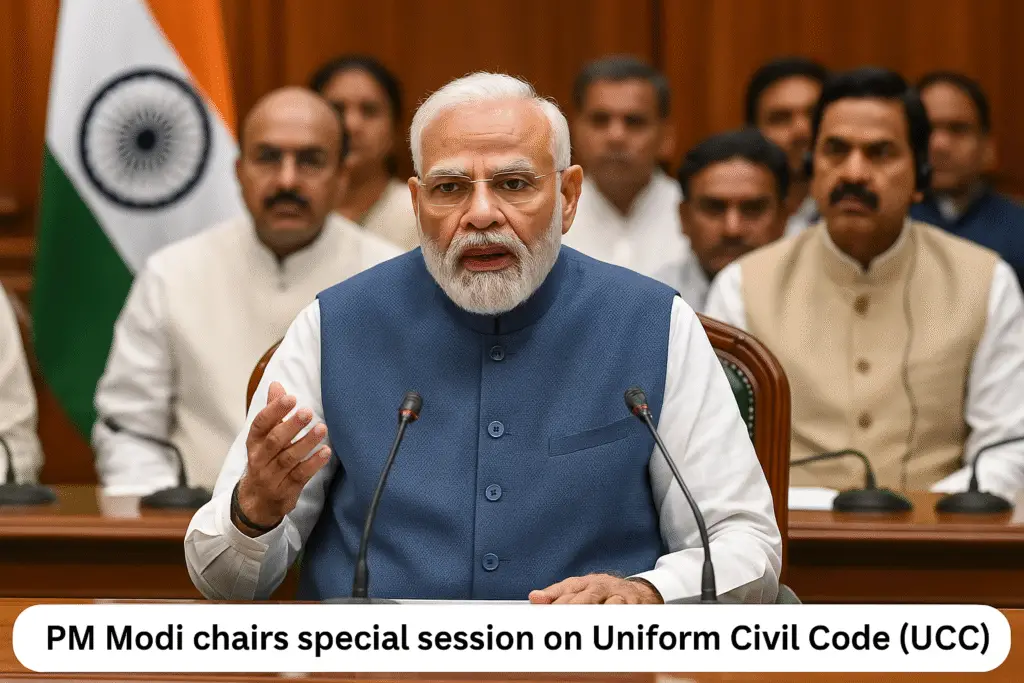
Prime Minister Narendra Modi today chaired a special parliamentary session to kickstart discussions around the Uniform Civil Code (UCC) — a subject that has remained at the heart of India’s constitutional debate for decades. The decision to place the Uniform Civil Code (UCC) at the center of national discourse has ignited passionate conversations across party lines, legal circles, and households alike.
What Happened in Parliament?
The special session, convened at the newly inaugurated Parliament House in New Delhi. PM Modi addressed both the Houses. During his speech, he emphasized the need for “equal laws for all citizens regardless of religion, gender, or caste.” He Futher stated,
“India cannot claim to be a modern democracy if personal laws continue to divide our people. The Uniform Civil Code (UCC) is about equality, justice, and national integration.”
Several lawmakers from the ruling BJP voiced strong support, calling it a long-overdue step toward unifying the nation’s legal framework. However, opposition leaders from the Congress, TMC, and AIMIM expressed concern over the timing and potential social impact of such a sweeping change.
⚖️ What Is the Uniform Civil Code (UCC)?
The Uniform Civil Code (UCC) seeks to replace personal laws — currently based on the scriptures and customs of each major religious community — with a common set of laws governing marriage, divorce, inheritance, and adoption for all Indian citizens.
While Article 44 of the Indian Constitution encourages the implementation of a UCC, it has remained largely unimplemented due to political sensitivities and social complexities.
🔥 Why Is This a Big Deal?
The move is historic because no central government in recent times has made such an assertive push toward implementing the Uniform Civil Code (UCC). Supporters argue it’s a progressive step toward gender justice and national unity, while critics fear it could erode cultural diversity and religious autonomy.
This special session is not a vote on a bill — yet. Instead, it marks the beginning of nationwide consultations and the formation of a multi-party legal advisory committee that will submit recommendations before any formal legislation is introduced.
📢 Public Reaction
The announcement has taken over social media, with hashtags like #UCCDebate, #PMModi, and #UniformCivilCode trending within hours. Citizens, celebrities, and legal experts have taken to X (formerly Twitter) and YouTube to express a mix of enthusiasm, curiosity, and concern.
Prominent voices from women’s rights groups have applauded the move, calling the Uniform Civil Code (UCC) a step toward real gender equality, particularly in the context of discriminatory personal laws. On the other hand, several minority organizations have demanded that their traditions and customs be protected under any new legal framework.
🔮 What’s Next?
Over the next few months, the government is expected to launch state-level consultations and public hearings to gauge sentiment and gather input. If consensus is achieved, a draft bill on the Uniform Civil Code (UCC) could be tabled in the Winter Session of Parliament.
Meanwhile, legal scholars expect intense debates in courts and across academia, as India grapples with balancing constitutional ideals with religious freedoms.
✍ Final Thoughts
Love it or oppose it — one thing is certain: the Uniform Civil Code (UCC) is no longer a distant constitutional dream. PM Modi’s decision to bring it to the national stage in 2025 marks a pivotal moment in India’s legal and social evolution.
As we await the next steps, every Indian — regardless of background — should stay informed, engaged, and vocal about how we envision justice and equality in a modern democracy.
❓ Frequently Asked Questions (FAQ) – Uniform Civil Code (UCC): PM Modi’s Bold Move
✅ 1. What is the Uniform Civil Code (UCC)?
The Uniform Civil Code (UCC) is a proposed set of common laws that would govern personal matters such as marriage, divorce, inheritance, and adoption for all Indian citizens, regardless of religion, caste, or community.
✅ 2. Why is the UCC being introduced now?
Prime Minister Narendra Modi recently revived the push for UCC in Parliament, calling it a move toward equality, national integration, and gender justice. The bill is being presented as part of the government’s commitment to constitutional uniformity and reform.
✅ 3. What did PM Modi say about the UCC?
PM Modi emphasized that separate personal laws based on religion have led to legal inequality, especially for women. He stated that the UCC is aimed at empowering citizens equally under one civil legal framework.
✅ 4. What are the key features of the proposed UCC bill?
The UCC bill includes:
Common age of marriage for all genders
Uniform inheritance and property rights
Standardized divorce and maintenance laws
Equal adoption and guardianship rights
✅ 5. Which states have already implemented UCC?
Goa is currently the only Indian state with a form of UCC already in place, inherited from the Portuguese Civil Code. It is often cited as a model for nationwide implementation.
✅ 6. Why is the UCC controversial?
Critics argue that:
It may infringe upon religious freedoms
It could undermine minority rights, particularly of Muslims, Christians, and tribal communities
The process lacks consultation and consensus-building
✅ 7. What is the opposition’s stance on the UCC?
Many opposition parties, including Congress, DMK, and AIMIM, have called the move politically motivated and divisive. They demand a wider public debate, involvement of minority communities, and clarity on how the law will be framed.
✅ 8. How have religious groups responded?
Several religious organizations, including Muslim Personal Law Boards and Church bodies, have raised objections, stating that UCC threatens religious identity and cultural autonomy.
✅ 9. What do supporters of the UCC say?
Supporters believe the UCC:
Promotes gender equality
Strengthens secularism and constitutional values
Simplifies the complex legal structure of personal laws
✅ 10. What’s next for the UCC in Parliament?
The bill is currently under parliamentary debate. It may be referred to a standing committee, followed by public consultations, amendments, and eventual voting in both Houses. The outcome is likely to shape India’s legal and social framework for years to come.




